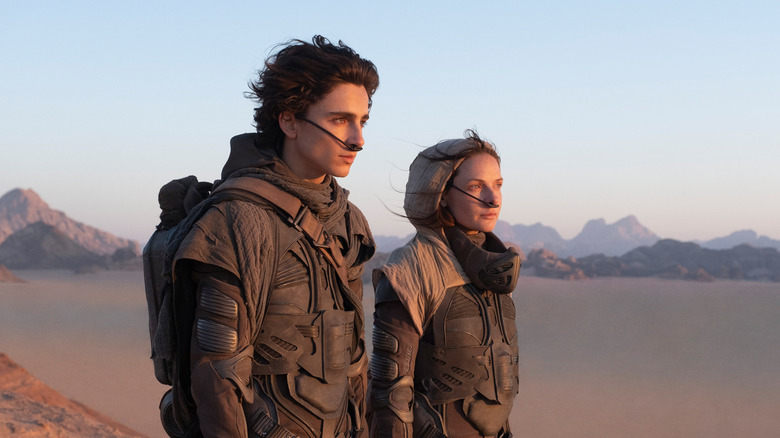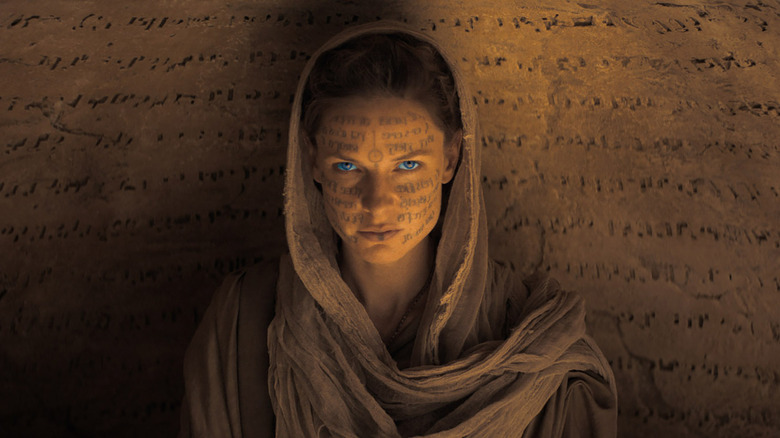Dune Review: Denis Villeneuve Delivers On Sensational And Spiritual Spectacle [Venice 2021]
Ever since "Star Wars" revolutionized mainstream science-fiction cinema, filmmakers have flooded the genre with various iterations on Joseph Campbell's hero's journey. This repeatable structure known as the monomyth is practically a default style of storytelling now, so commonplace that perceptive viewers can settle into a comfortable, complacent groove within its auspices. Denis Villeneuve's "Dune" fits the model to a T yet accomplishes a new feat by restoring the sense of wonder and awe the hero's journey is meant to inspire.
"Dune" is technically IP for Warner Bros. given the wealth of material available to adapt from Frank Herbert's sci-fi novels, but it feels nothing like the boardroom blockbusters littering the landscape today. Villeneuve grants extraordinary breathing room in establishing the quest of Timothée Chalamet's Paul Atreides, the burgeoning leader of his aristocratic house primed for planetary governance of Arrakis, a land of sand and spice. Two and a half hours sail by, never once weighed down by a large cast of characters or vast array of universe-specific details.
This patience is either not afforded or not seized by any other director working at this scale. The average shot length of "Dune" must be two or three times longer than the average studio release but never feels leaden in the slightest. Villeneuve grants his audience time to take in the majesty of futuristic architecture, the intricacy of the imaginative costuming, or the complexity of a reaction to rapidly shifting situations.
Ceremony, Ritual, and Lofty Stakes
Of course, "Dune" has to plow through some exposition dumps at the outset — that's only natural given that Herbert's novel comes with an appended glossary for all the terms he created. But this is ultimately not a barrier to entry given how minimally Villeneuve dwells on the universe's terms or technology. They would be little more than window dressing if the film did not rest on his strong elemental backbone of monomyth. It's wholly recognizable yet wholly its own unique phenomenon.
The minutiae of "Dune" are not an end to themselves, a series of Easter eggs or subtle references meant to tickle the fancy of those already converted. This is not a fan-service film tailored for devotees of this specific journey. Rather, it's one that can pierce the psyche of anyone with the capacity for inspiration from these stories.
Looming large among the reasons "Dune" can elicit such grandeur is the fact that Villeneuve, along with his co-screenwriters Jon Spaihts and Eric Roth, do not sand down the obvious messianic elements of Herbert's book. They never take the audience's acceptance of the story's importance for granted, opting to go big with mythology rather than relying on lazy shorthand to have audiences fill in the mental blanks. But they don't overload the allegory, either, so the overtones don't distract from the progression of the story itself as Paul prepares for his unexpected ascent.
Stemming from this mystical throughline, Villeneuve takes an uncommon interest in both the form and function of ceremony and ritual in "Dune," thus establishing the resonance of this fantastical universe with familiar structures in our own. Yet in embracing Paul's emergence as a source of omniscience and salvation, they establish genuinely lofty stakes for the film, ones that match the scale of ambition and action on display. Their consequences also feel larger-than-life, not just limited to a studio's bottom line, and the responsibility of conveying them largely rest on Chalamet's performance.
On the Shoulders of Chalamet
Chalamet's interpretation of the Paul Atreides character, formally speaking, is miles away from his breakout turn in "Call Me By Your Name." Unlike that role, where a world of inner turmoil expressed itself through a jittery physical performance, Chalamet is all studied stillness in "Dune." Yet underneath that placid exterior lies the same amount of chaotic conflict with which a maturing character must grapple. He broods without the blankness of Ryan Gosling in Villeneuve's last directing gig, "Blade Runner 2049." It speaks to Chalamet's extraordinary versatility and range as an actor that he can command the screen when painting with broad strokes of physicality or subtle pointillist emoting.
There's even evolution within the movie itself as the shifting sands of power move Paul out of the shadows and into the seat of power. "Dune" grapples with weighty concepts like the proper exercise of political might, the weight of authority, the power of prophecy, as well as the conflict between being both man and messiah. The quiet turmoil of Chalamet's performance embodies all these tensions as he comes to understand his own position at the center of a vast ensemble. Paul's coming to terms with the reality that he represents a beacon of hope bright enough to merit the sacrifice of loved ones proves as breathtaking as any visual effects in the film.
This is Only the Beginning
And that is saying quite a lot, given that the eye-popping visuals invoke the full sublimity of science-fiction cinema. The effects work of "Dune" thunder with the full bellow of thematic resonance. Everything from the film's sandworms to spaceships looks and feels unlike anything else put on-screen. Villeneuve cares about their construction long enough to encourage cinematographer Grieg Frasier to linger on them, too, not cutting away quickly to mask mediocre design work. He's not just invoking the imagination that makes the hero's journey so compelling. "Dune" manufactures the magic of movies where the dreams can be as big as the screens that display them.
"This is only the beginning," remarks Paul with an impish grin as the film closes — part one, as the opening title card states. Bravo to Denis Villeneuve for calling his shot to will a sequel into existence. Part two of "Dune" must happen so he can finish the hero's journey he started. Audiences deserve to see the conclusion of an action film so immaculately crafted and patiently paced, one that's more focused on inspiring reverent amazement through the simplicity of durable storytelling structures rather than the complexity of cinematic universe building.
/Film Rating: 9 out of 10



